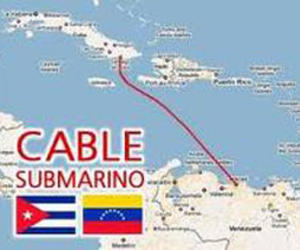Cable could spur Cuba telecom market past PR’s
- Submitted by: manso
- Business and Economy
- 02 / 14 / 2011

The Associated Press. HAVANA — A long-awaited undersea fiber-optic cable linking Cuba with the outside world arrived on the island last week, promising a bandwidth bonanza for a country saddled with exorbitant telephone rates and among the slowest Internet connection speeds on the planet.
The cable connecting Cuba with key ally Venezuela was brought ashore in the eastern resort of Siboney in a ceremony attended by dignitaries from the two countries, the state-run Prensa Latina news agency reported.
The cable is not expected to be operational until the summer, but its arrival is a landmark for an island that often feels cut off from the outside world, 52 years after Fidel Castro’s revolution turned it from decadent American playground to crumbling Soviet satellite. Venezuela President Hugo Chávez has heralded the link as a way to break the 50-year U.S. “blockade” of Cuba.
Cuba’s population of 11.4 million could become the largest telecom market in the Caribbean, topping Puerto Rico’s $1.6 billion market, according to Pyramid Research. Even if the market remains mostly closed, annual revenue could still reach $400 million by 2013 from the current $80 million, Pyramid said.
When finished, the cable is expected to increase Internet speed 3,000-fold and be capable of handling about 80 million simultaneous phone calls.
That’s good news in a country where Web pages open at the speed of molasses oozing out of a jar. A recent report by Akamai Technologies Inc. said Cuba has the second slowest Internet speed in the world, besting only the tiny Indian Ocean-island chain of Mayotte.
And that’s for those lucky enough to have online access.
A report last year by Cuba’s National Statistics Office said only 2.9 percent of the population had used the Internet over a 12-month period, most through work or school — the lowest level of Internet penetration in the Western Hemisphere.
Deputy Information Minister Jorge Luis Perdomo told reporters at a technology conference last week that, for now at least, Cubans would continue to be able to connect solely through their jobs or through school.
He said the limitations were not the result of any political concern over what increased connectivity will mean, but rather a product of the sorry infrastructure on the island and the time it will take to improve it.
The fiber-optic cable project is being carried out by Alcatel-Lucent SA of Paris for the state telecommunications companies of Cuba and Venezuela. Cuban officials have said it is expected to cost about $70 million, and be functional in June or July. A second segment will extend from Cuba to nearby Jamaica.
Cuba relies on slow, expensive satellite links because the U.S. government’s 48-year embargo has prevented most trade between the island and the United States and has made companies in other countries shy away from doing business with Cuba.
A pricing dispute between the U.S. and Cuba may have cost U.S. companies including AT&T Inc. and Verizon Communications a foothold in the island’s freshly opened telecommunications market.
U.S. companies had been backing a separate venture by Miami-based TeleCuba Communications Inc, which said it was granted a license to build a 110-mile link from Key West to Havana after President Barack Obama loosened the trade embargo for telecommunications providers in 2009. The project has been delayed over the Federal Communications Commission’s refusal to accept price demands by President Raúl Castro’s government for routing calls, Bloomberg reported.
“This is a huge missed opportunity,” said Chris Sabatini, senior policy director at the New York-based Council of the Americas, a business group, told Bloomberg. “If you can get into a market early on, you can control it all along the value chain.”
Cuba, which will have the last remaining state-run telecommunications monopoly in Latin America after private companies start operating in Costa Rica this year, has the lowest mobile-phone penetration in the region, according to the United Nations’ International Telecommunications Union.
As recently as 2008, there were between 20,000 and 30,000 mobile phones on the Caribbean island, most of them owned by foreign diplomats and senior Cuban officials. That has grown to 800,000 since Raúl Castro in 2008 lifted a ban on most people owning them, according to the Cuba Study Group, which is made up of U.S. businesses that support more open commercial ties with Cuba.
“Cuba is the gold mine everyone is after in Latin America,” José Magana, a senior analyst at Pyramid, told Bloomberg. “Pressure will build on the U.S. government to let U.S. companies participate in the opening of Cuba’s market.”
Cubans, meanwhile, have high hopes for the cable between the island and Venezuela, despite warnings that things will not change quickly.
“I think it is fantastic,” said Lazaro More, a musician who twice a week goes to a Havana “cybercafe” that allows access to a limited number of internal Web sites and e-mail options. He spends $3 for two hours of service, a fortune for many since Cubans earn an average of just $20 a month.
“I am sure this will make it a lot easier for Cubans to communicate with the rest of the world,” he said.
Source: www.caribbeanbusinesspr.com/news03.
Comments